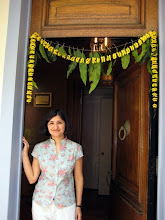The winter holidays begin in 3 days. In this frame of mind (where I am already halfway to Brazil), I am naturally at my lethargic and lazy best - hence the posting of this review, which I wrote around last year for our School newsletter. In the spirit of Eco-friendly recycling and the impending holidays, I reproduce below my little write-up on Charles Dickens' A Christmas Carol.
Enjoy!
* * * * * * * * * * * * * * * * * * * * * * * * * * * * *
 More than 150 years have gone by since Charles Dickens' A Christmas Carol in Prose, Being a Story of Christmas was first published, yet the story continues to be told and re-told from generation to generation. It is a story so familiar to us that it is almost easy to forget that few of us have actually ever read it. Our imaginations can conjure at will its most famous characters; even without having read Dickens' cutting indictment of him, Scrooge is always pictured in our mind's eye as a hunched old man with a drooping, pointed nose. His name is as synonymous to us with miserliness as Romeo and Juliet's are with Love; as Arjuna's is with Bravery and as heart-shaped sun-glasses are with Lolita.
More than 150 years have gone by since Charles Dickens' A Christmas Carol in Prose, Being a Story of Christmas was first published, yet the story continues to be told and re-told from generation to generation. It is a story so familiar to us that it is almost easy to forget that few of us have actually ever read it. Our imaginations can conjure at will its most famous characters; even without having read Dickens' cutting indictment of him, Scrooge is always pictured in our mind's eye as a hunched old man with a drooping, pointed nose. His name is as synonymous to us with miserliness as Romeo and Juliet's are with Love; as Arjuna's is with Bravery and as heart-shaped sun-glasses are with Lolita. I thus approached 'A Christmas Carol' with a mixture of curiosity as well as presumption. Would the story read any differently than it is told? Would it be a typically Victorian moralistic tale or would it reveal greater depth? Are some classics better left…unread?
Happily for me, the answer to the last question is a resounding 'No'. Only a few pages into the novella I realized that spoken summaries can never do justice to the vividness of Dickens' writing. I found myself utterly engrossed in long passages devoted to, for example, a quality of light or even a table setting! Even more surprising were the dark and disturbing images contained within what I always thought to be somewhat of a 'fairy', feel-good story. It is truly a testament to strong writing and narratorial ability when a story you know well can still keep you in suspense and, occasionally, terrify you.
The greatest revelation, however, was that Dickens created in Scrooge, not a black-and-white caricature, but a complex, intelligent man who is, indeed, not as morally different from us as we would like to believe. As we accompany Scrooge and his ghost-guides on their journey through time, Dickens uses gentle humour and rhetorical stratagems to gradually bring us to a surprising understanding - namely, that Scrooge ultimately represents you and I, stripped of our pretenses and justifications. The moral message of the story hinges upon this crucial realization, for it is in identifying ourselves in Scrooge that we can truly attempt to change ourselves.
As the evenings get chillier and we approach the 25th of December, it would serve us well, in today's cynical world, to (re)visit this timeless tale and travel along with Scrooge on a journey that is as much about the spirit of Christmas as it is about discovering who we are.


